Overview
Securing a buy-to-let mortgage as a non-UK resident requires a clear understanding of specific eligibility criteria, documentation needs, and unique challenges, such as higher deposit requirements and stricter lending standards. Non-residents must prepare comprehensive financial documentation and stay informed about market trends to significantly improve their chances of approval.
Successful investment in the UK property market can yield substantial rental income, despite the hurdles faced.
Are you ready to navigate this complex landscape and seize the opportunities that await?
Introduction
In the evolving landscape of real estate investment, buy-to-let mortgages offer a compelling opportunity for non-UK residents eager to tap into the UK property market. These specialized financial products enable investors not only to generate rental income but also to diversify their investment portfolios within a stable and resilient market. However, navigating the complexities of securing such mortgages can be daunting.
For those unfamiliar with the stringent lending criteria and documentation requirements that often accompany non-resident applications, the process can seem overwhelming.
With a growing interest from overseas investors and robust demand for rental properties, understanding the nuances of buy-to-let mortgages is essential. Are you ready to make informed decisions in this lucrative sector? By familiarizing yourself with the intricacies of these financial products, you position yourself to capitalize on the opportunities that await in the UK property market.
Understanding Buy-to-Let Mortgages for Non-UK Residents
Buy-to-let loans serve as specialized financial products tailored for individuals looking to invest in real estate for rental purposes. For non-UK residents, a buy-to-let mortgage presents a unique opportunity to penetrate the lucrative UK real estate market without the necessity of residency. One of the primary advantages of buy-to-let loans is their ability to generate rental income, which can yield substantial returns on investment.
These loans are characterized by their capacity to finance assets expected to deliver rental returns, making them an attractive option for investors. However, non-UK residents must be aware that a buy-to-let mortgage typically comes with distinct terms compared to standard residential mortgages. This often entails higher deposit requirements—generally around 25% or more of the asset's value—and potentially elevated interest rates, reflecting the perceived risk associated with lending to non-residents.
Finance Story is committed to partnering with you to devise the optimal funding solution for your circumstances, offering a comprehensive range of conventional and private alternatives.
Current estimates reveal that affluent international investors hold a significant share of London's luxury real estate market, indicating robust demand for a buy-to-let mortgage among non-UK residents. Notably, statistics from 2024 suggest that the rental property market for non-UK residents is poised for expansion, with numerous overseas investors pursuing buy-to-let mortgages to secure stable returns amid a fluctuating global economy.
Successful case studies underscore the effectiveness of rental investments by non-UK residents. Many investors have reported impressive rental yields, particularly in highly sought-after areas of London, where demand for rental properties remains elevated. This trend illustrates the viability of utilizing a buy-to-let mortgage as a strategic investment resource for rental property financing.
Expert opinions reinforce the benefits of these loans. Financial analysts assert that a buy-to-let mortgage for non-UK residents can serve as a means to diversify investment portfolios, especially in a market renowned for its resilience and potential for capital appreciation. As financial specialists like Sue Lukes have highlighted, strategically leveraging rental property loans can enhance investment outcomes for non-residents.
As the market landscape evolves, firms like Finance Story, which has a dedicated lending partner in the UK for expat loans, are devoted to assisting clients in navigating these opportunities. This commitment ensures that investors are well-equipped to make informed decisions in the UK real estate market.
Challenges Faced by Non-UK Residents in Securing Mortgages
Non-UK residents frequently encounter significant hurdles when seeking a buy-to-let mortgage in the UK. One of the primary challenges is the stricter lending criteria imposed by financial institutions. Typically, non-residents are required to provide a larger deposit, often ranging from 25% to 40% of the property's value, which can be a substantial financial barrier.
Furthermore, access to specific financial institutions may be restricted, limiting the options available to these buyers. The documentation requirements can also be daunting. Non-residents must furnish comprehensive evidence of their income and financial stability, which often includes bank statements, tax returns, and proof of employment.
This necessity for extensive documentation can delay the application process and create additional stress for potential investors. Another significant obstacle is the challenge of establishing a UK credit history. Without a credit history in the UK, non-residents may find it challenging to obtain favorable loan terms, as lenders usually depend on credit scores to evaluate risk. This lack of a credit history can lead to increased scrutiny during the approval process, making it even more challenging for non-residents to obtain financing.
Statistics indicate that by Q3 2025, approximately 7.2% of all UK home loans may have a loan-to-value (LTV) ratio of 90% or higher, reflecting the tightening of lending standards across the board. Additionally, the current housing finance market is characterized by rising rates and a cost of living crisis, which have collectively made it more difficult to secure loans compared to previous years. However, there has been a noted increase in home loan approvals in 2024, suggesting a potential recovery in the market.
It is also important to note that foreign nationals can buy property in the UK without a Visa, but obtaining a home loan is likely to be difficult, compounded by affordability issues and scrutiny.
Understanding these challenges is crucial for non-residents aiming to navigate the complexities of the UK home loan landscape effectively. By grasping the stricter lending standards and the necessary documentation, potential purchasers can better prepare themselves for the application process and enhance their chances of obtaining a buy-to-let mortgage. As noted by Sue Lukes and others, the current landscape presents unique challenges that require careful consideration and strategic planning.
At Finance Story, we pride ourselves on being one of Australia’s most innovative commercial and personal funding specialist brokerages, dedicated to curating expert funding solutions tailored to your needs, even in challenging circumstances. Our tailored financing services, which include personalized consultations and access to a comprehensive portfolio of private and boutique commercial investors, are designed to assist you in overcoming these hurdles, ensuring a smoother funding journey. With offices in both Australia and the UK, we are well-positioned to support your financing needs across borders.
Eligibility Criteria for Non-UK Residents
Qualifying for a buy to let mortgage as a non-UK resident involves navigating several essential criteria that financial institutions typically require. These include:
- Minimum Annual Income: Most lenders expect applicants to demonstrate a minimum annual income, often set at £50,000 or more. This threshold can vary based on the lender's policies and the applicant's financial profile.
- Proof of Stable Income: Applicants must provide evidence of a reliable income source, which may encompass salary, rental income from current assets, or returns from investments. This documentation is crucial for establishing financial stability.
- Substantial Deposit: A significant deposit is generally required, typically around 25% of the asset's value. This upfront investment not only reduces the lender's risk but also reflects the applicant's commitment to the property.
- Credit History: A clean credit history is vital; applicants should not have recent adverse credit events, such as missed payments or bankruptcies, which could jeopardize their application.
- Identification: A valid passport and proof of identity are necessary to verify the applicant's identity and residency status.
Comprehending these criteria is essential for non-residents to evaluate their eligibility before applying for a buy to let mortgage. Recent trends indicate a rise in inquiries from foreign nationals regarding loan eligibility, particularly concerning residency status and visa conditions. As the financing landscape evolves, financial institutions are tightening their criteria, making it increasingly important for potential investors to be well-informed.
In 2025, the eligibility requirements for non-UK resident property investment loans reflect a more stringent approach, with many lenders favoring applicants who can demonstrate established ties to the UK. This shift underscores the importance of having a comprehensive understanding of the requirements and preparing the necessary documentation in advance. Financial advisors emphasize that meeting the minimum income requirements and maintaining a solid credit history are pivotal for successful applications, especially in a competitive market.
Furthermore, James Watch, Head of Analytics at UK Finance, noted that "the housing loan market demonstrated greater resilience than previously anticipated in 2024," which may provide reassurance to non-UK residents considering investment. Moreover, potential investors should be aware of the legal implications of residing in a rental unit without proper authorization, as this is considered banking fraud and can lead to legal penalties. Additionally, with the rise of short-term letting options, such as those available through platforms like Airbnb, understanding the current market environment is essential for making informed investment decisions.
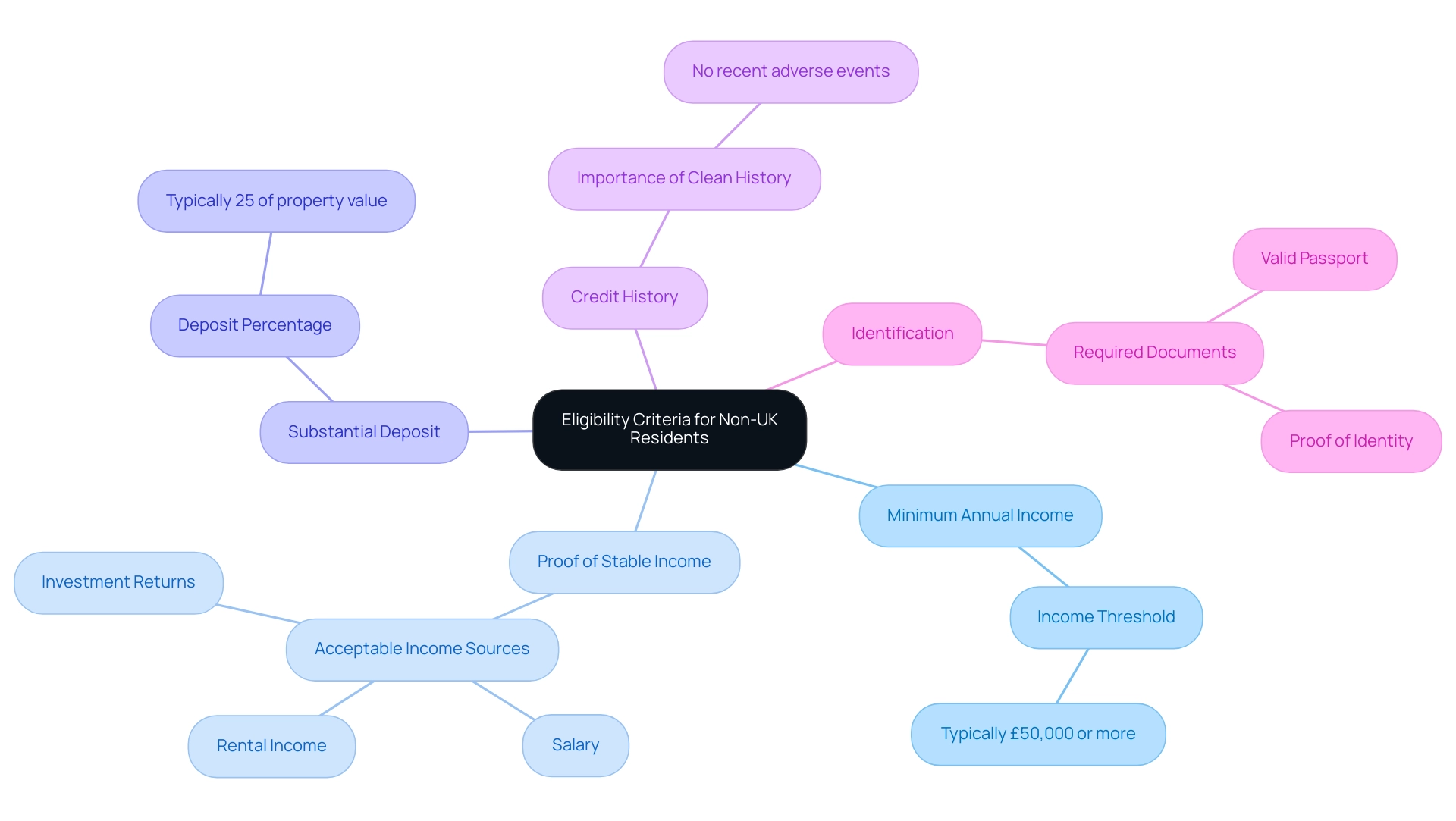
Necessary Documentation for Non-UK Resident Applications
When seeking a buy-to-let mortgage for non-UK residents, compiling a comprehensive set of documents is essential to bolster the application. The essential documentation typically includes:
- Proof of Identity: A valid passport or national ID is required to verify the applicant's identity.
- Evidence of Income: This can be demonstrated through payslips, tax returns, or bank statements, showcasing the applicant's financial stability.
- Credit Report: A credit report from the applicant's home country is crucial, as it provides financial institutions with insight into the applicant's creditworthiness.
- Proof of Deposit: Bank statements that clearly show the funds available for the deposit are necessary to confirm the applicant's financial readiness.
- Property Details: Information about the property being purchased, including its estimated rental income, is vital for financial institutions to assess the investment's viability.
- Additional Documentation: Financial institutions may request further documentation, which can vary by institution, so applicants should be prepared to provide any extra information as needed.
Having these documents organized and readily available can significantly expedite the application process, increasing the likelihood of a successful approval. According to recent statistics, the average loan interest rate stands at 3.51%, with borrowers typically paying around £5,290 in loan-related interest annually. This highlights the significance of thorough preparation, as timely and complete documentation can result in more favorable borrowing terms.
Common challenges encountered by non-UK residents include navigating the varying documentation requirements across financial institutions. Experts suggest that applicants seek advice from financing professionals, such as those at Finance Story, to ensure they comprehend the specific requirements of their selected lender. Finance Story specializes in tailored residential investment solutions, offering a full range of mainstream and private funding options that cater to both first-time buyers and seasoned investors.
This proactive approach can help mitigate potential issues and streamline the application process for a buy-to-let mortgage for non-UK residents, ultimately leading to a successful investment in the UK property market. Additionally, it is worth noting that building societies, which are owned by their members, can provide alternative financing options for non-UK residents. Furthermore, loan approvals in the UK are most commonly granted between August and October, making it crucial for applicants to consider timing when submitting their applications.
As emphasized by Just Group, the average age to repay a home loan in the UK is now 65, underscoring the significance of long-term financial planning for non-UK residents. Lastly, recent statistics indicate a slight decrease in loan arrears, reaching £8.7 billion in Q1 2024, suggesting an improvement in the financial stability of homeowners in the UK, which may be relevant for potential investors.
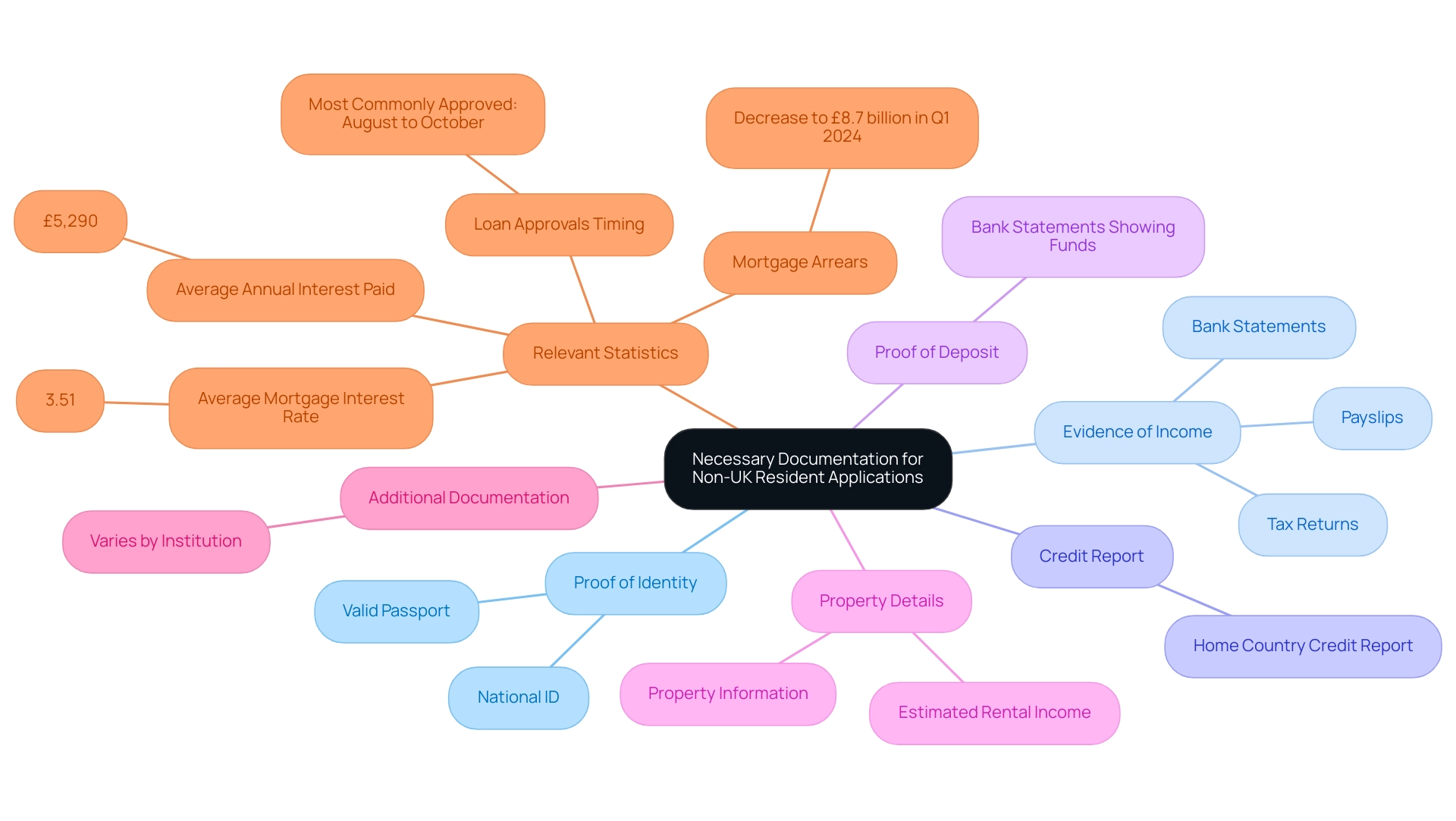
Choosing the Right Lender for Your Buy-to-Let Mortgage
Selecting the appropriate financial institution is essential for non-UK residents seeking a buy-to-let mortgage. Several key factors warrant consideration:
- Interest Rates: Comparing rates from different providers is vital to identify the most competitive offers. Current trends indicate that the housing loan market has shown resilience, with many financial institutions adjusting their rates to attract international buyers. As James Tatch, Head of Analytics at UK Finance, noted, the housing loan market demonstrated greater resilience than previously anticipated in 2024.
- Fees: Understanding the full cost of borrowing is crucial. Be mindful of application fees, valuation fees, and any ongoing costs associated with the mortgage. These fees can vary significantly among financial institutions, impacting the overall affordability of the mortgage.
- Institution Reputation: Conduct thorough research on potential providers by reviewing customer feedback and service ratings. A financial institution's reputation can significantly influence the smoothness of the application process, which is particularly important for non-residents who may face additional hurdles.
- Flexibility: Some financial institutions offer more adaptable terms, especially concerning rental income calculations or deposit requirements. This flexibility can be a game-changer for non-residents who may have different financial profiles compared to local applicants.
- Specialization: Seek out financial institutions that focus on non-resident loans. These institutions often provide tailored products and possess a deeper understanding of the unique challenges faced by international buyers. Notable financial institutions like HSBC, NatWest, and Skipton International have developed specific offerings that cater to non-residents, facilitating smoother application processes and providing exceptional support. A recent case study emphasizes how these financial institutions assist non-residents in navigating the borrowing landscape effectively.
As the market evolves in 2025, it’s crucial to stay informed about the best providers of buy-to-let mortgages for non-UK residents. Statistics suggest that by Q3 2025, around 7.2% of all UK loans may have a loan-to-value (LTV) ratio of 90% or higher, indicating an increasing accessibility of financing options. This trend highlights the significance of choosing a financial institution that not only fulfills your monetary requirements but also comprehends the complexities of the non-resident loan environment.
Additionally, eligibility for applying can be checked using an enquiry form, which also provides a Decision In Principle, offering practical guidance for prospective borrowers.
By considering these factors and leveraging expert opinions, non-UK residents can navigate the loan selection process more effectively, ensuring they choose a lender that aligns with their investment goals.
Financial Considerations: Taxes and Rental Income Potential
As a non-UK resident, investing in properties necessitates a comprehensive understanding of the buy-to-let mortgage landscape and navigating various financial considerations critical for success. Key aspects to evaluate include:
- Rental Income: It is essential for non-residents to ensure that the rental income generated from the property sufficiently covers mortgage payments and associated expenses. Lenders typically require that rental income covers at least 125% of the mortgage interest, which serves as a safeguard for both the lender and the investor. According to finance journalist Harry O'Sullivan, "Rental assets can mean a substantial second income, with some locations in Australia currently generating an annual yield in excess of 5% of the asset value."
- Tax Obligations: Non-resident landlords are subject to UK tax on their rental income. To effectively manage these tax obligations, it is crucial to register for the Non-Resident Landlord Scheme. This registration allows landlords to receive their rental income without tax being deducted at source, provided they meet certain criteria. Additionally, understanding strategies such as negative gearing can be beneficial. Negative gearing occurs when the expenses of owning an investment asset surpass the income it produces, enabling investors to offset losses against their taxable earnings, which can enhance profitability upon selling an asset.
- Additional Costs: Beyond mortgage payments, investors should account for various extra expenses, including management fees, maintenance costs, and insurance. These costs can significantly impact overall profitability and should be factored into the investment strategy.
- Currency Fluctuations: Non-residents must also be mindful of potential currency risks when converting rental income back to their home currency. Fluctuations in exchange rates can affect the actual income received, making it vital to consider this aspect when calculating returns on investment.
- Consulting Professionals: Given the complexities involved, it is highly recommended that investors consult with professionals for legal, tax, and investment advice before making decisions regarding buy-to-let investments. This guidance can assist in navigating the intricacies of the UK real estate market and ensure compliance with all regulations.
Evaluating these financial factors is crucial for making informed investment decisions in the UK property market. By understanding the implications of rental income, tax obligations, additional costs, and currency risks, non-UK residents can better position themselves for success when applying for a buy-to-let mortgage in the buy-to-let sector.
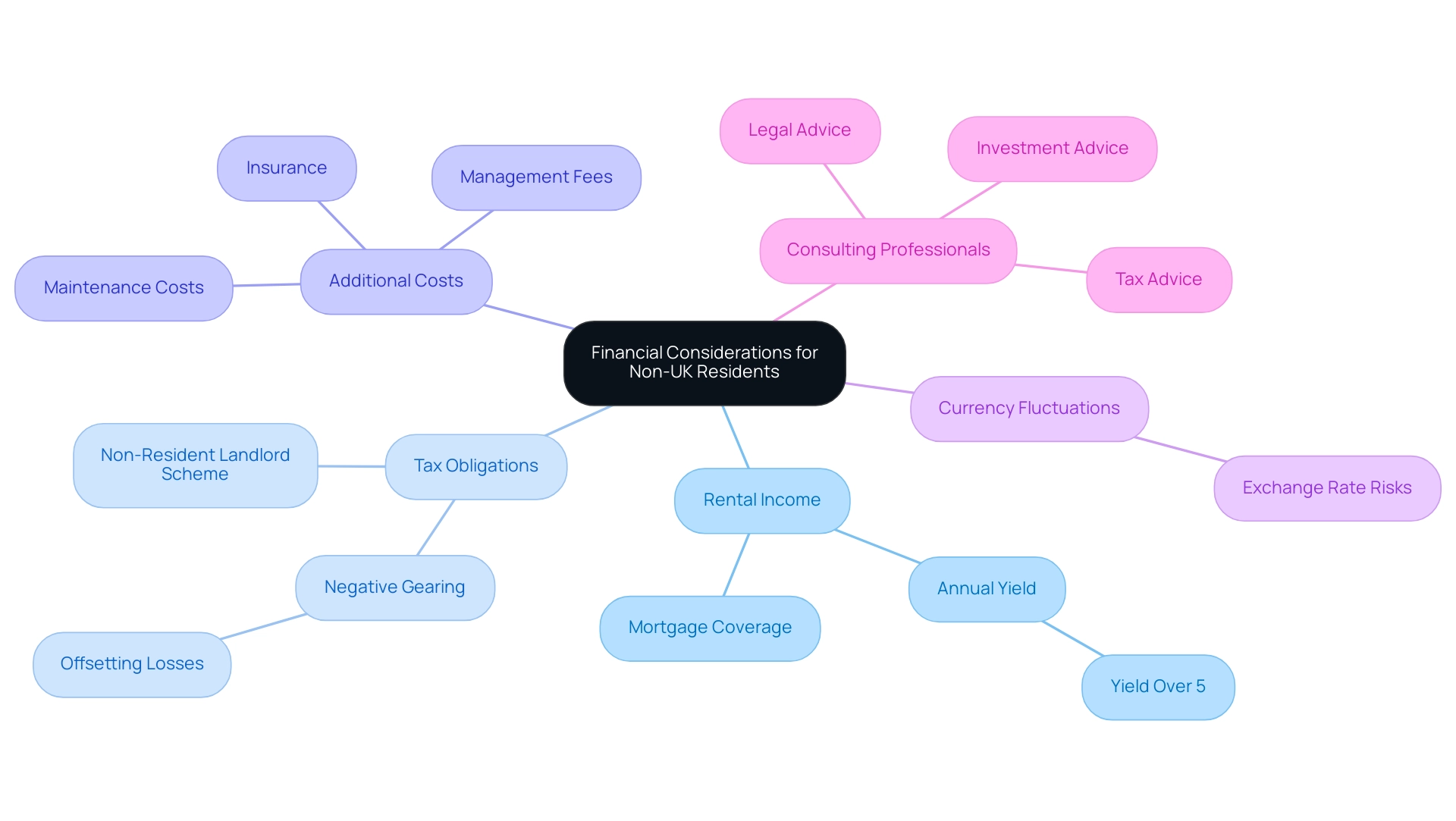
Tips for a Smooth Mortgage Application Process
To facilitate a smooth loan application process for non-UK residents, consider the following essential tips:
- Prepare Documentation in Advance: Gather all necessary documents, such as proof of income, bank statements, and identification, before initiating the application. This proactive approach can help avoid unnecessary delays and streamline the process.
- Maintain a Good Credit Profile: A solid credit history is crucial. Ensure that your credit report reflects responsible borrowing habits and timely payments, as this can significantly impact your loan approval chances. Establishing a UK credit history is especially crucial, as it demonstrates financial stability, which financial institutions seek in non-resident applicants. Engaging a mortgage broker who specializes in buy-to-let mortgages for non-UK residents can provide invaluable insights. Their expertise can assist in navigating the complexities of the application process and identifying financial institutions that cater specifically to international buyers, such as HSBC, NatWest, and Skipton International, which offer tailored support for obtaining a buy-to-let mortgage for non-UK residents.
- Be Transparent: Honesty is key when dealing with financial providers. Provide accurate and complete information to build trust and credibility, which can enhance your chances of securing favorable terms.
- Stay Informed: Keeping abreast of market trends and lender requirements is essential. As forecasts indicate a potential increase in loans over 90% LTV to approximately 7.2% by Q3 2025, adapting your strategy in response to these changes can be beneficial. Additionally, with current interest rates affecting loan extensions—32% of borrowers have had to extend their loans for home improvements—it's crucial to understand how these factors may influence your application.
Implementing these strategies can significantly improve the likelihood of a successful loan application, allowing non-UK residents to navigate the UK property market with confidence. Moreover, demonstrating financial stability and preparing comprehensive documentation are crucial steps that can further enhance your application prospects.
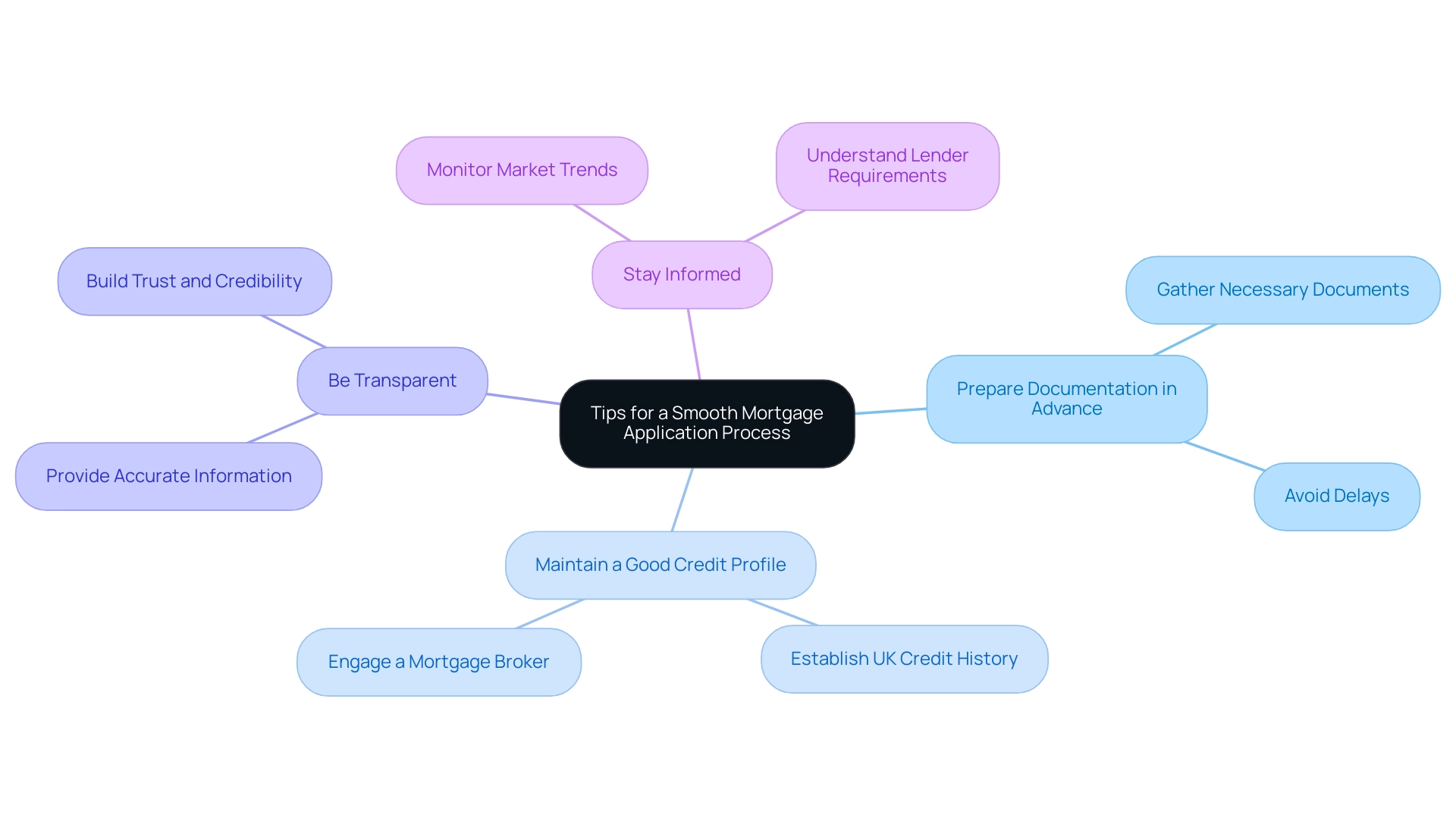
Current Market Trends in Buy-to-Let Mortgages for Non-Residents
The buy-to-let financing market for non-residents in 2025 is shaped by several key trends that potential investors must consider:
- Interest Rates: This year, interest rates for buy-to-let loans have seen notable fluctuations. Many lenders are now offering competitive rates specifically designed to attract non-resident investors seeking a buy-to-let mortgage for non-UK residents. This reflects a dynamic lending environment that is crucial, as it can significantly impact the overall cost of borrowing and the potential return on investment. Notably, the market participation rate has risen to a record high of 67.3%, indicating strong interest and engagement from investors, particularly due to recent regulatory changes introducing new eligibility criteria and terms. Staying informed about these changes is vital for applicants, as they can directly influence the approval process and the conditions attached to loans.
- Demand for Rental Units: Demand for rental units in the UK remains robust, especially in urban centers where housing shortages are prevalent. This sustained demand can provide a dependable income stream for investors, making rental investments an appealing choice.
- Economic Factors: Broader economic conditions, including inflation rates and employment statistics, significantly shape the real estate market and influence rental yields. For instance, while inflationary pressures may affect purchasing power, a resilient labor market can support rental demand and stability in property values. The RBA has noted that the negative effects of higher US tariffs and elevated uncertainty on growth in China are expected to be offset by increased fiscal policy support, which could further influence the UK market. By closely monitoring these trends, non-residents can strategically position themselves to seize opportunities within the buy-to-let mortgage for non-UK residents. This ensures informed decisions that align with their investment goals. Additionally, with Finance Story's commitment to innovation and adaptability in the lending process, investors can access tailored financial solutions that meet their unique needs, setting them apart in a competitive landscape.
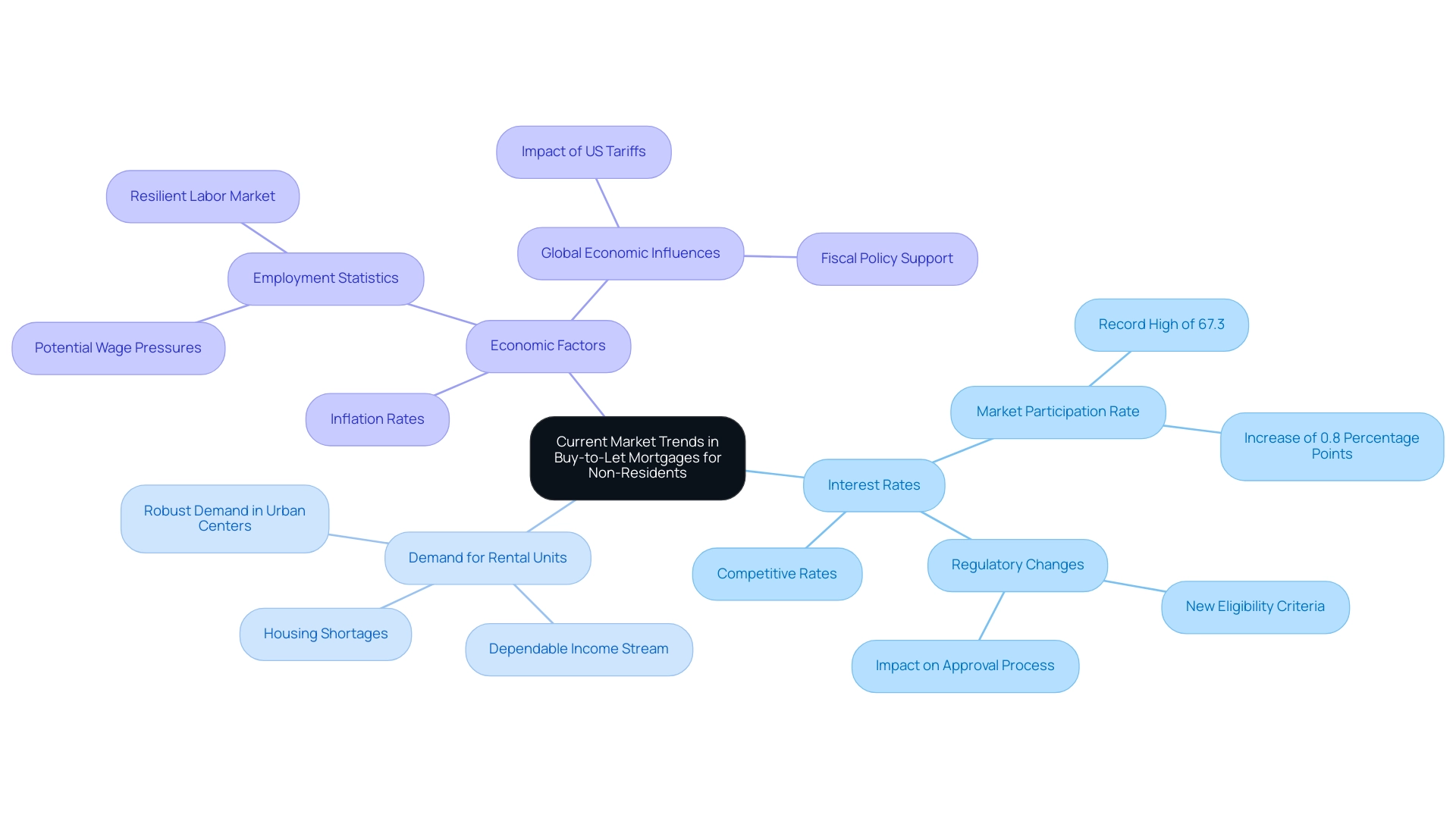
Conclusion
Buy-to-let mortgages present a significant opportunity for non-UK residents eager to invest in the thriving UK property market. These specialized financial products not only enable investors to generate rental income but also facilitate portfolio diversification within a stable economic environment. However, securing these mortgages entails a unique set of challenges, including stringent lending criteria, substantial deposit requirements, and extensive documentation needs.
Understanding the eligibility criteria and necessary paperwork is crucial for non-residents aiming to navigate the complexities of this market effectively. By being prepared and informed, potential investors can enhance their chances of securing favorable mortgage terms. Additionally, selecting the right lender is essential; factors such as interest rates, fees, and lender reputation can significantly influence the overall borrowing experience.
As the buy-to-let landscape continues to evolve, staying informed about current market trends, regulatory changes, and economic factors is vital. The increasing demand for rental properties, coupled with competitive interest rates, creates a promising environment for non-resident investors. Consulting with mortgage professionals can further streamline the application process and improve investment outcomes.
In conclusion, with careful planning and strategic decision-making, non-UK residents can successfully leverage buy-to-let mortgages to capitalize on the lucrative opportunities available in the UK property market. By understanding the intricacies involved and preparing accordingly, investors are well-equipped to embark on their property investment journey with confidence.




